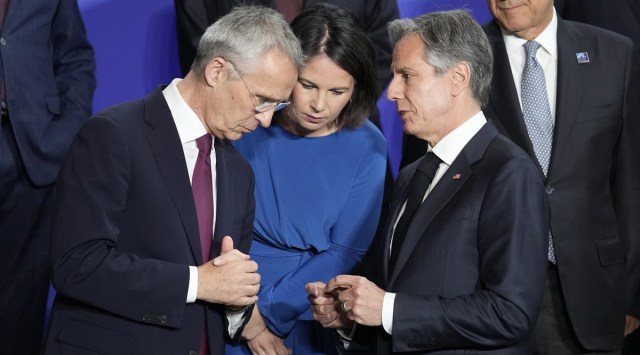NATO Secretary General JENS STOLTENBERG has said that China is closely following the war in Ukraine because it will have an impact on Beijing’s calculations on any potential use of force. For India, he said, the war matters as it is about global security and a rules-based international order. On the sidelines of the informal NATO Foreign Ministers’ meeting in Oslo on Thursday, Stoltenberg spoke to SHUBHAJIT ROY on a range of issues — from India’s contacts with NATO to China’s aggressive behaviour. Edited excerpts:

What we see now is a continued war of aggression against a sovereign, independent nation with internationally recognised borders. And what President (Vladimir) Putin and the leadership in Moscow did was to blatantly violate international law, send tens of thousands of troops and battle tanks into Ukraine, and this has caused enormous suffering… The right for self-defence is enshrined in the UN Charter and therefore Ukraine defends against aggression, and NATO allies help them to uphold that right.
India has done this diplomatic tightrope walk, with Russia on one side and the West on the other. What are your thoughts about it?
Well, first of all, I think that the war in Ukraine matters not only for Ukraine, but for all of us. It matters for global security, because if President Putin succeeds in Ukraine, it will be a tragedy for the Ukrainians, but it will also make the world more dangerous. It will send the message that when authoritarian leaders use force, they can achieve what they want and that will make all of us more vulnerable.
And we know that Beijing has closely watched the war in Ukraine, because the higher the price President Putin pays, the higher the reward he may potentially have. That will be part of the Beijing’s assessment regarding potential use of force. So this matters for India… for all of us…it is about global security, rules-based international order.
China has backed Russia at various global forums. How does NATO view China’s role?
Story continues below this ad
What we see is that China has not been able to condemn this blatant violation of international law. We see how Russia and China are working more and more closely.
China’s aggressive behaviour in the Indo-Pacific has been watched very closely. Does that ring alarm bells for NATO?
It demonstrates that security is no longer regional, security is global. What happens in the Indo-Pacific and Asia matters for Europe and what happens in Europe matters for Asia. Beijing is closely following Ukraine, because it will impact their their calculations on any potential use of force. And this matters, again, to all of us. We have seen how China has taken control over parts of South China Sea, their coercive behaviour, the threat of potential use of violence against Taiwan.
And also at Indian border?
Yes… of course, we have seen a more assertive China, trying to coerce neighbours. And this highlights that when China and Russia have joint naval patrols, air patrols, big naval exercises, the idea that we have one Asian theatre and then the European theatre is absolutely wrong. Security is global, we need to stand together and India being the biggest democracy in the world, sharing the same values as NATO allies, believes in a rules based international order. Of course, we need to stand up for those rules.
Story continues below this ad
There have been some contacts between India and NATO in recent years under your Secretary Generalship. What are the areas of cooperation the two sides are looking at?
For NATO, it’s important to have partners also outside their territory… I think there is a potential in developing more contacts and the close relationship with India but of course, it’s for India to decide whether they are ready.









